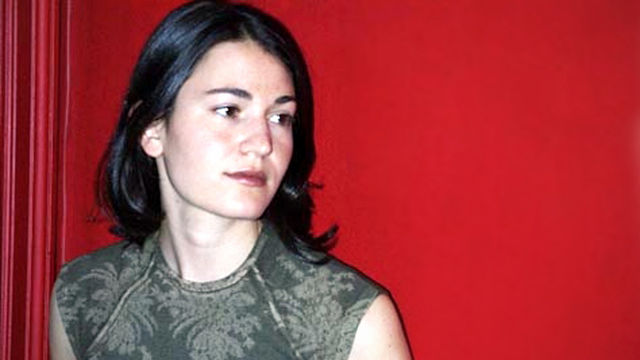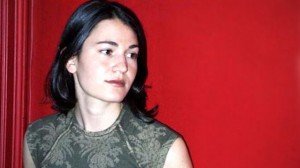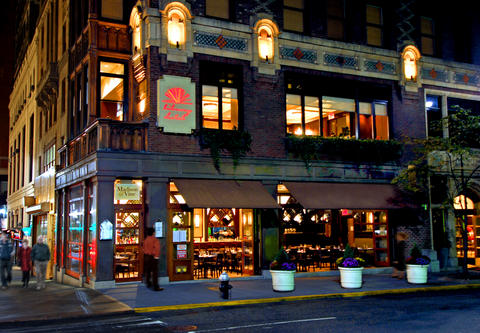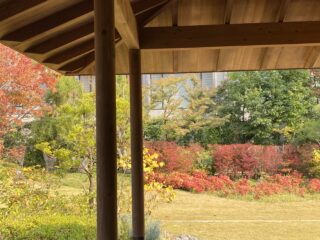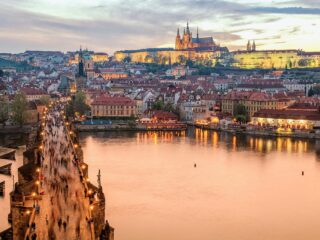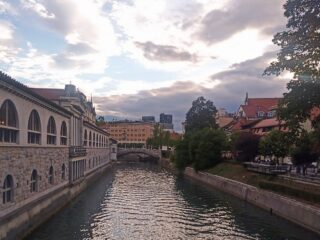“During the Age of Glass, everyone believed some part of him or her to be extremely fragile. For some it was a hand, for others a femur, yet others believed it was their noses that were made of glass. The Age of Glass followed the Stone Age as an evolutionary corrective, introducing into human relations a new sense of fragility that fostered compassion.”
The rain was tropical, otherworldly, completely out of place for New York City in January. It poured down in sheets of cerulean, cascading over the steel of the subway car in hot, foamy waves. The thought of removing my hat and scarf and gloves passed briefly through my mind, but there was a strange comfort in the excessive warmth, in the heat of the blood that rushed to my face.
I was standing alone in the Buhre Avenue station, waiting for the number six train to arrive and bring me downtown, where I would attend a going-away party for friends who would not be coming back, mourning a loss that had not yet occurred.
The Singer children, 15 year-old Alma and her younger brother Bird, had suffered a loss as well, albeit a fictional one: the death of their father from pancreatic cancer. I’d started reading Nicole Krauss’ The History of Love on the plane that brought me back to my hometown.
It had been only two weeks since my return from Europe, a journey that had spanned thirteen countries and eleven months. It was undertaken as a great act of rebellion against the forces that had begun to shape a life I felt uncomfortable living: one in which an endless cycle of work influenced everything from the clothes I wore to what I did on the weekend (which was, inevitably, more work).
In each of those countries, I shed a layer of the person I used to be and became someone far happier. In England, I let go of the person who needed a physical residence to feel safe. In France, I abandoned my fear of slowing down. In Germany, I discarded the notion that friends are people who are just like me and began to seek out those who, instead, enriched my life with their differences.
I didn’t know it yet, but I was playing a game of “What I Am Not;” a game played by the Singer children in which they deny whole rooms, years, weathers. They point to a chair and say, “This is not chair” or to a wall and say, “This is not a wall” or to a sink of dirty dishes and say, “Not dirty dishes,” just like I had pointed to myself and declared that it wasn’t the same person anymore. Because saying so was the first step.
“If at large gatherings or parties, or around people with whom you feel distant, your hands sometimes hang awkwardly at the ends of your arms – if you find yourself at a loss for what to do with them, overcome with sadness that comes when you recognize the foreignness of your own body – it’s because your hands remember a time when the division between mind and body, brain and heart, what’s inside and what’s outside, was so much less.”
By the time I stepped off the train, the sun had gone down, and I wandered the East Village until it was time for the party. Little lonely trees sprang up out of the ground like bits of coral, and the streetlamps clicked on with a phosphorescent glow. The steady drizzle and early darkness made it difficult to remember that I was a creature of the land.
At the party, I chatted awkwardly with people I’d known for ages, and realized that in my nearly year-long absence, my old friends had made new friends: indeed, some had fallen in love, others had gotten married, and many had moved across the country, as these were about to. I felt disoriented as they laughed over memories that I didn’t share, and when they sang along to the pop songs that were familiar to them, I tried to clap in Krauss’ “language of gestures” that was subtle and complex in my mind, but probably clumsy to watch.
Even my mother tongue had become foreign to me. I spoke the melodic textbook English that was an effective form of communication in Europe, rather than the speedy, slang-filled speech of my native city. I was like Alma who, upon being asked “What’s up” by a friendly boy at school, replies with a bewildered “Finethankyouhowareyou?”– rather than with the simpler, standard “Not much”. It was embarrassing.
So I stayed for one drink more, then said a few hasty goodbyes. I hurried out of the bar and back to the train station, back to my mother’s apartment in the Bronx, back to Alma’s search for human contact and far away from mine.
“Even now, all possible feelings do not yet exist. There are still those that lie beyond our capacity and our imagination. From time to time, when a piece of music no one has ever written, or a painting no one has ever painted, or something else impossible to predict, fathom, or yet describe takes place, a new feeling enters the world. And then, for the millionth time in the history of feeling, the heart surges, and absorbs the impact.”
Days later I was scrambling around the Financial District, lost and late for a lunch appointment, when I passed 31 Chambers Street. It’s a beautiful building, dove gray in the Beaux Arts style, with a three-story colonnade and the kind of baroque theatricality that belongs more readily in Paris than it does in New York. I remembered the passage I’d read earlier, of Alma’s exchange with a clerk at this very address. She was searching the City Municipal Archives for records on the life and death of the woman she knew to be her namesake: Alma Mereminski, the main character and inspiration behind her parents’ favorite book, also called The History of Love. Young Alma sat reading ancient newspaper articles on microfiche for hours, distressed yet determined, until the attending clerk finally suggested that a death certificate would be at the New York City Department of Health, in the Division of Vital Records. Alma’s first and only thought was: “Great.”
It wasn’t until I was standing in front of the building itself that I realized her response wasn’t a sarcastic one; in fact it was quite the opposite: positive and strangely life-affirming in a situation that might otherwise have been frustratingly depressing. For months she’d been searching for a way to make her mother happy again, a way to understand her suddenly, mysteriously religious brother, a way to reconcile the family she used to have with the one they’ve become, and she believed heartily that finding the original Alma would do it. Yet it is this small exchange between her and a stranger that produces the “Aha” moment: a brief yet powerful declaration that despite such profound change, things could – and would – be “great.”
I considered this as I went through the motions of my meeting. Although neither my lunch mate nor my Cobb salad inspired much insight, I felt curiously hopeful. It was as though I had finally surfaced for air after many weeks as a bottom-dweller.
Later, after getting on the subway at Brooklyn Bridge-City Hall (which is either the very first or the very last stop, depending on the direction the train is going), I made it a point to sit at the end of the car, in one of the slim two-seater benches that are typically left unshared unless it happens to be rush hour. It seemed important to be alone with my thoughts.
But despite the early hour, the train became crowded as we crossed into Harlem. A woman in her 60s, laden with packages, sat down next me and I scooted to make room. She was silent for a long while, until she said, “It’s cold on this train.”
Then she looked at me expectantly, so I told her, “I think they have the air conditioning on,” which seemed to be a worthy enough response for her to launch into a description of the car she had recently sold, the job she had just come from, and the boyfriend she was going home to.
And she either didn’t notice or didn’t care that I had little to say in return: she seemed happy enough with my tacit agreement and acknowledging smile. My stop approached and quickly came, so I thanked her for the lovely conversation and wished her a nice day. The woman called out, “Bye honey!” before whipping a small book out of her handbag that she buried her nose into. Our encounter couldn’t have lasted longer than a few minutes, but I felt reenergized by her particular brand of New York City kindness: swift instances of cheerful warmth or sunny compassion, with an equally speedy return to poker-faced normalcy.
On the short walk home, I reflected on Alma’s pain and my own, and our parallel realizations that just a bit of bravery is required to attain this important recognition of both one’s self and the other: that circumstances might change, but we’re certainly never alone. Then, turning the key in the door, I thought that just as Krauss wrote, my heart too, can absorb the impact.

